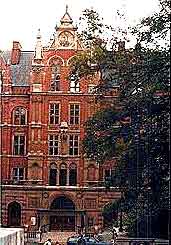
The Royal College of Music Museum
Prince Consort Road, SW7
 The Royal College of Music Museum houses what is probably London's most surprising and most difficult to see collection. Tucked into the basement of the college building in Prince Consort Road, the museum boasts a clavichord owned by Haydn, a spinet that probably belonged to Handel and trombones that belonged to Elgar and Holst. Yet many who would relish the opportunity to see these and many other marvellous exhibits miss the museum completely because there is virtually nothing to advertise its presence outside. On top of this, the museum is only open on Wednesday afternoons in term time (though at least the literature says nothing about there having to be in 'R' in the month!). So it is even easier to miss. The Royal College of Music Museum houses what is probably London's most surprising and most difficult to see collection. Tucked into the basement of the college building in Prince Consort Road, the museum boasts a clavichord owned by Haydn, a spinet that probably belonged to Handel and trombones that belonged to Elgar and Holst. Yet many who would relish the opportunity to see these and many other marvellous exhibits miss the museum completely because there is virtually nothing to advertise its presence outside. On top of this, the museum is only open on Wednesday afternoons in term time (though at least the literature says nothing about there having to be in 'R' in the month!). So it is even easier to miss.
Despite these anomalies, the Royal College of Music Museum is a must-see. Arranged on two levels, it comprises a fabulous range of instruments from around the world, all of which are clearly displayed either free standing or in groups inside glass cabinets.
Just about every type of instrument is represented here from harps to hurdy-gurdies, from flagelots to pocket fiddles, many with exquisite handwork. Among the ancient pieces to be seen is a fifteenth century clavicytherium, the oldest keyboard stringed instrument in existence. Another item of special interest is a guitar on which David Rizzio is believed to have played. Rizzio, who was secretary and advisor to Mary Queen of Scots, fell victim to a political conspiracy in 1566.
As well as maintaining this remarkable collection the Royal College of Music Museum now acts as a key resource for those interested in making music as it was originally played. At least two orchestras have taken advantage of records and drawings in the museum's archives to reproduce some of the period instruments to be seen here.
* The most comprehensive collection of portraits of musicians in the country can also be found at the Royal College of Music in the Department of Portraits and Performance History. There are around 280 originals and 7,000 prints and photographs. The department also houses other valuable source materials such as the UK's largest archive of concert programmes and the Organ Club's collection of 20,000 photographs of organ cases.

The Royal College of Music, Prince Consort Road, SW7.
Museum open: Wednesdays in term time (except January) 2 p.m. - 4.40 p.m.
Entrance fee: Adults: £1.20 , children and senior citizens: £1.00.
Tours for groups lasting approximately 40 minutes can be booked at £3 per head. There is a minimum charge of £25.
The Royal College of Music's Department of Portraits and Performance History is open Monday to Friday from 10.00 a.m. to 5.30 p.m. except for 10 days over Easter & Christmas. Admission is free.
 South Kensington (Circle, District & Piccadilly lines) South Kensington (Circle, District & Piccadilly lines)
Copyright © Jan Collie 2002
Published by permission of the author.
All rights reserved. No reproduction, copy or transmission of this publication may be made without written permission. |